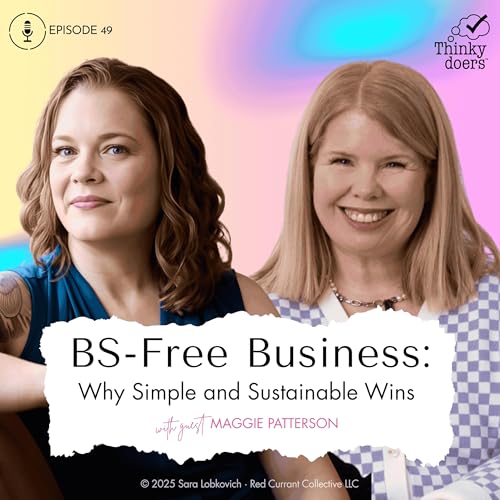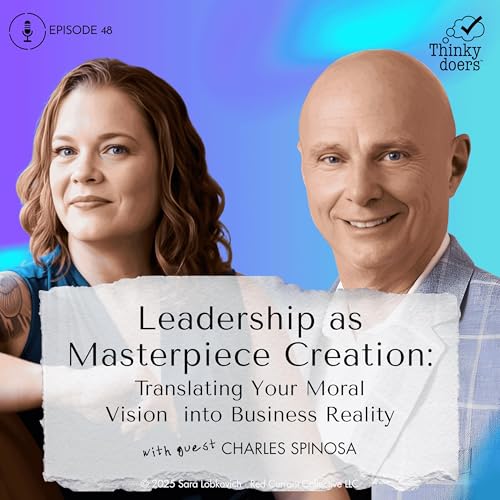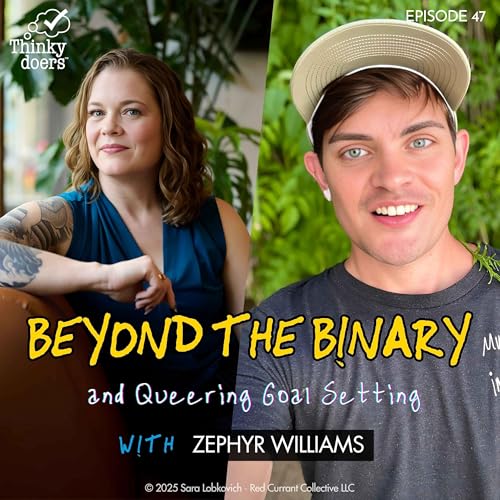Ever feel like your brain just won’t quit, and traditional meditation only makes it worse? Thinkydoers host Sara Lobkovich gets it. She lives mostly in her head, and practices like meditation or breathwork have often felt out of reach. They seemed like they were designed for people who are naturally calm and centered — not her.But this conversation with Chauna Bryant shifted everything. Chauna is a trauma-informed breathwork professional, and founder of Breath Liberation Society. She also describes herself as “probably the least chill meditation teacher you’ll ever meet.”
Together, they explore how breathwork can offer a more accessible entry point for overthinkers and busy brains. Instead of forcing stillness, breathwork gives the mind something active to focus on — what Chauna compares to “giving your brain an iPad” to occupy it — while the body does its own work.
They also talk about how breathwork differs from traditional meditation, why it’s particularly helpful for people with trauma histories, and how starting small (even just two breaths or two minutes) can be helpful.
If mindfulness has ever felt like it wasn’t made for your kind of mind, this episode is for you.
Episode Highlights:
- Why breathwork succeeds where traditional meditation fails for many people
- The difference between activating and calming breathwork techniques
- How to start a somatic practice when you're resistant to body-based work
- Trauma-informed approaches to breathwork and nervous system regulation
- The power of "titration" - starting with just 2 minutes instead of diving in
- Why consent and agency are crucial in breathwork practice
- Understanding breathwork as "nervous system pushups" for stress resilience
Key Concepts Explored:
- Conscious connected breathing and three-part breath techniques
- The origins and cultural lineages of breathwork practices
- How breathwork allows nonverbal processing of emotions and trauma
- The importance of finding trauma-informed, skilled practitioners
- Why patience becomes "your first form of body connection"
Common Questions Answered:
- What exactly is breathwork and how is it different from meditation?
- How can I start if I'm resistant to body-based practices?
- Is breathwork safe for people with trauma history?
- What should I expect from my first breathwork experience?
Notable Quotes:
“Breathwork gives the brain something to do. It’s just weird enough that it helps the body start to process what we’ve shelved or ignored.” — Chauna Bryant [00:04:00]
“Whatever you’re doing, try like a minute. Try two minutes. Give it two minutes and then get out. That’s the way to start to build that body connection.” — Chauna Bryant [00:14:00]
“For a lot of us with busy brains, patience is going to be our first form of body connection.” — Chauna Bryant [00:16:00]
“Just let the experience exist without having to slap words on it.” — Chauna Bryant [00:31:00]
“In breathwork, you get to choose as much or as little as you do—and whatever you choose, you’ll be cheered on fiercely.” — Chauna Bryant [00:34:00]
Chapters:
[00:00:00] Introduction: Welcome to Thinkydoers and Meet Chauna Bryant
[00:02:00] What is Breathwork? Active Meditation for Busy Brains
[00:05:00] Origins and Cultural Lineages of Breathwork Practices
[00:06:00] From Brain-Centered to Body-Aware: Sara and Chauna's Common Ground
[00:08:00] Chauna's Journey: From Gymnast to "Least Chill Meditation Teacher"
[00:11:00] The Meditation Failure and Discovering Breathwork
[00:12:00] Getting Started: Overcoming Resistance to Somatic Practices
[00:15:00] Perfectionism and All-or-Nothing Thinking in Body
 12 m
12 m 28 m
28 m 39 m
39 m 36 m
36 m 39 m
39 m Jun 11 202520 m
Jun 11 202520 m 33 m
33 m 35 m
35 m
